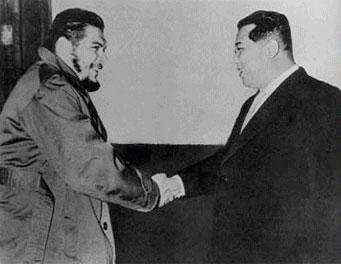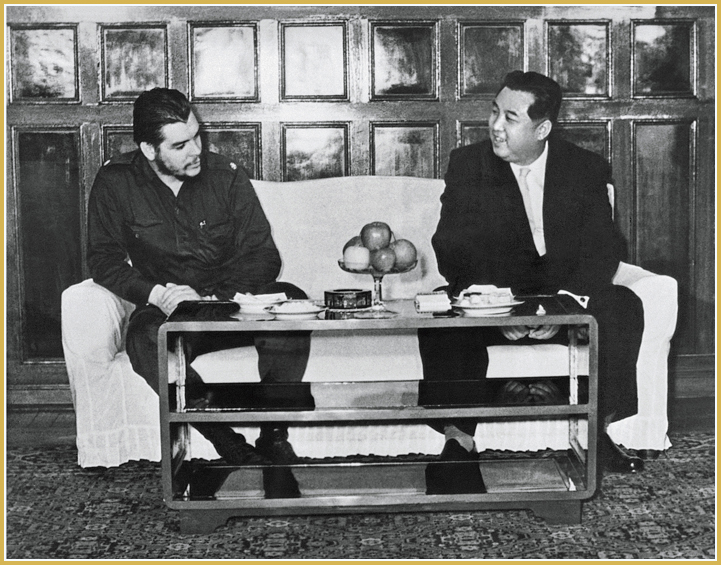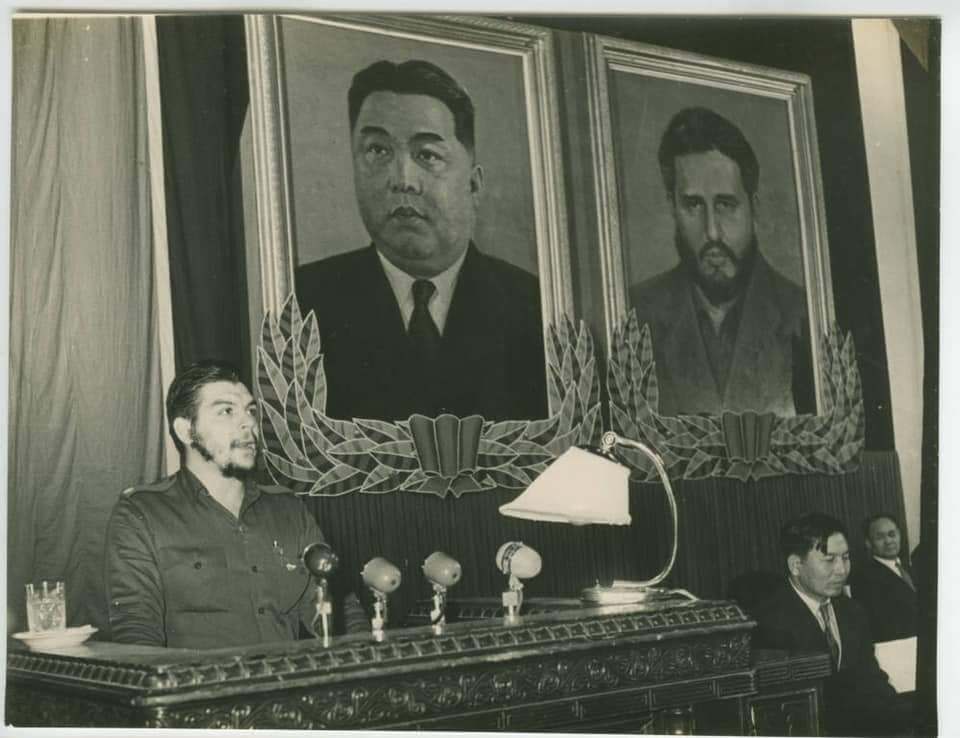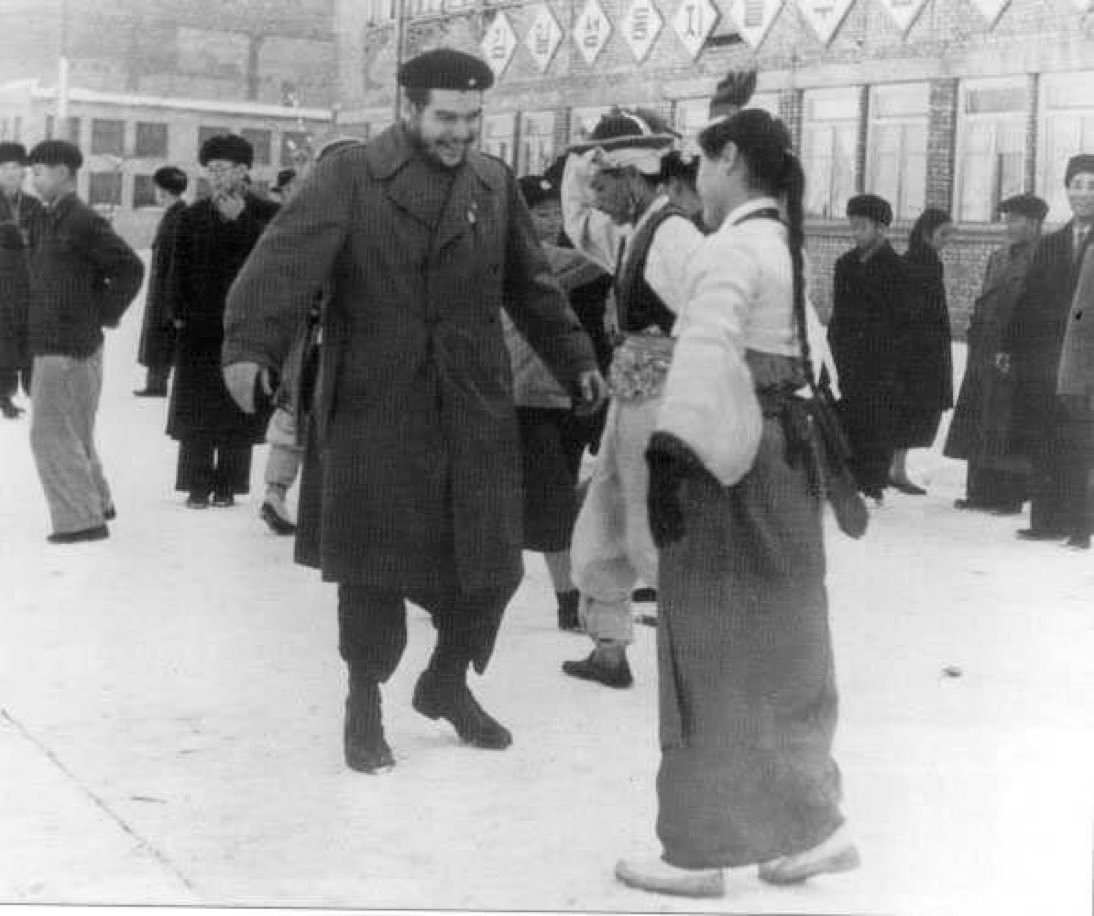
In December 1960 the Argentine and Cuban revolutionary Ernesto "Che" Guevara traveled to the Democratic People's Republic of Korea (DPRK) within the framework of the international tour that he carried out as a member of the Cuban government for which he toured different countries of the socialist camp in order to learn from the experience of other socialist countries and use it for Cuba's socialist construction /

In the capital of the DPRK Pyongyang, Che Guevara was received by the Korean revolutionary leader Kim Il-Sung, President of the Democratic People's Republic of Korea, and after his stay in the Korean nation, Che left his words about his experience and what he felt about the Korean people and the development of socialism in the DPRK.They are reproduced below

“Of the socialist countries that we visit personally, Korea is one of the most extraordinary. Perhaps it is the one that impressed us most of all of them. It has only ten million inhabitants and is the size of Cuba, a little less, about one hundred and ten thousand square kilometres. The same land area as the southern part of Korea, but half the population, was plagued by a war so fantastically destructive that nothing remained of its cities, and when one says nothing, it is nothing. It is like the small towns of guano that Merob Sosa and Sánchez Mosquera and those people burned here, and of which there was nothing left but ashes. Thus, for example, Pyonyang, which is a city of a million inhabitants, remained. Today there is not a single remnant of all that destruction, everything is new. The only memory that remains is, on all roads,
naenarakimilsung119They showed me many of the factories, all rebuilt and others made new, and each one of those factories had supported between 30 and 50 thousand bombs. If we get an idea of what were 10 or 12 bombs thrown around us in the Sierra, which meant a terrible bombardment, and you had to have your courage to endure those bombs, which meant 30 thousand bombs dropped in one ground space, sometimes less than a cavalry!
Korea came out of the war without a standing industry, without a standing house, even without animals. At a time when the air superiority of the Americans was so great, and it no longer had anything to destroy, aviators had fun killing oxen, killing what they found. So it was a veritable orgy of death that hung over North Korea for only two years. In the third year the Mig-15 appeared and things have already changed. But those two years of war meant, perhaps, the most barbaric systematic destruction ever done.
Everything that can be said about Korea seems like a lie. For example, in the photographs you see people with hatred, that hatred of the peoples when it reaches the deepest part of the being, which is seen in the photos of caves where 200, 300 and 400 children, of an age of 3 or 4 years old, they are murdered there with fire and other times with gas. The dismemberment of the people, killing pregnant women with bayonets to make the child come out of the bowels, burning the wounded with flamethrowers ... The most inhumane things that the mind can imagine were carried out by the US Army of occupation. And it went almost to the edge of Korea with China, and it occupied, at one point, almost the entire country. Added to that, in the retreat they destroyed everything, we can say that North Korea is a country that was made of deaths. Naturally, he received the help of the socialist countries, especially the aid of the Soviet Union, in a generous and very extensive way. But what most impresses is the spirit of that people. They are a people that emerged from all this after thirty years of Japanese domination, from a violent struggle against Japanese domination, without even having an alphabet. In other words, it was one of the most backward peoples in the world in that sense. Today it has a national literature and culture, and a national order and practically unlimited development of culture. They have secondary education, which is up to the ninth grade, compulsory for everyone. They are a people that emerged from all this after thirty years of Japanese domination, from a violent struggle against Japanese domination, without even having an alphabet. In other words, it was one of the most backward peoples in the world in that sense. Today it has a national literature and culture, and a national order and practically unlimited development of culture. They have secondary education, which is up to the ninth grade, compulsory for everyone. They are a people that emerged from all this after thirty years of Japanese domination, from a violent struggle against Japanese domination, without even having an alphabet. In other words, it was one of the most backward peoples in the world in that sense. Today it has a national literature and culture, and a national order and practically unlimited development of culture. They have secondary education, which is up to the ninth grade, compulsory for everyone.
It has in the whole industry a problem that we wish we had today -which we will have in 2 or 3 years-, which is the problem of lack of labour. Korea is rapidly mechanizing all of agriculture to increase productivity and to realize its plans, and is also preparing to bring the product of textile factories and others to South Korea's brothers to help them bear the brunt of colonial rule. North American.
It is really the example of a country that thanks to a system and extraordinary leaders, such as Marshal Kim II-Sung, has been able to emerge from the greatest misfortunes to be an industrialized country today. North Korea could be for anyone here in Cuba, the symbol of one of the many backward countries in Asia. However, we sell them a semi-processed sugar such as raw sugar, and other still unprocessed products, such as textiles and they sell us milling lathes, all kinds of machinery, mining machinery, that is, products that need a high technical capacity to produce them. So it is one of the countries that we are most excited about. ”

- REPORT OF A TRIP TO THE SOCIALIST COUNTRIES, DECEMBER 31, 1960 (PAGES 57 AND 58) ERNESTO CHE GUEVARA COMPLETE WORKS.
Our thanks to KFA Argentina .
Translation by UK KFA

No comments:
Post a Comment